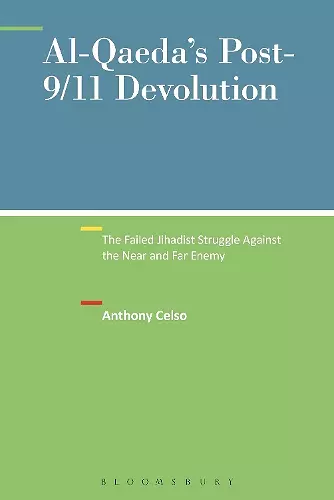Al-Qaeda's Post-9/11 Devolution
The Failed Jihadist Struggle Against the Near and Far Enemy
Format:Paperback
Publisher:Bloomsbury Publishing PLC
Published:22nd Oct '15
Currently unavailable, and unfortunately no date known when it will be back

This in-depth study looks at the decline of al-Qaeda since 9/11, examining the forces that have led to its fragmentation and the organization's future.
This examination of al-Qaeda's decline since the 9/11 attacks focuses on the terror organization's mutation and fragmentation. It looks at its partnership with the local and regional jihadist networks that played a pivotal role in the Madrid, London, and Fort Hood attacks, arguing that, although initially successful, such alliances actually unraveled following both anti-terror policies and a growing rejection of violent jihadism in the Muslim world. Challenging conventional theories about al-Qaeda and homegrown terrorism, the book claims that jihadist attacks are now organized by overlapping international and regional networks that have become frustrated in their inability to enforce regime change and their ideological goals. The discussion spans the war on terror, analyzing major post 9/11 attacks, the failed jihadist struggle in Iraq, al-Qaeda's affiliates, and the organization's future prospects after the death of Osama Bin Laden and the Arab Spring. This assessment of the future of the jihadist struggle against Muslim governments and homegrown Islamic terrorism in the West will be an invaluable resource to anyone studying terrorism and Islamic extremism.
Dr. Celso makes a substantial contribution to the scholarship with this new work. Consistently and accurately researched, and articulately written, this book will make important and ground breaking reading for policy makers and academics alike. This book should be required reading for anyone who truly wishes to understand the Al-Qaeda threat. * Bruce E. Bechtol Jr., Associate Professor of Political Science, Angelo State University, USA *
A superb work that takes the reader far beyond the traditional and inaccurate representations of Al-Qaeda and its affiliates as existential threats to the global community and in particular the West. Using a wealth of primary and secondary sources, Celso illustrates how weak these extremist organizations are, how harried they are by their pursuers, and why concerns about the threats they pose, if by no means unfounded, are in general overblown. The devolution of Al-Qaeda into weaker affiliate groups with less capable leaders and major impediments to funding, training, and the execution of attacks, is clear throughout the narrative. Celso explains with great skill how the 'hunters' have become the 'hunted,' and the degree to which Al-Qaeda has become, in the author’s words, 'a badly crippled and failed organization.' Will be profitably read by military, homeland-security, and law-enforcement personnel as well as scholars and any serious students of terrorism. * Robert S. Ehlers, Jr., Ph.D., Professor of Security Studies, Angelo State University, USA *
Anthony Celso has written an exceptionally important book on the "devolution" of Al-Qaeda after 9/11. While some pundits still believe that Al-Qaeda remains a viable terrorist organization, Celso's research has revealed the opposite. He shows in clear terms that Al-Qaeda's central message of jihad is failing to resonate with affiliates and associated organizations and that fragmentation has caused their 'vexation and exhaustion' campaign to founder. While Al-Qaeda still has the capacity to cause serious trouble, Celso shows that they are in organization in decline and this is good news for everyone. * Charles P. Neimeyer, Ph.D. Director, USMC History/Gray Research Center, Quantico, VA, USA *
Dr. Celso’s book takes its readers into the fascinating journey of exploring the changing nature of global terrorist networks, as a separately acknowledged phenomenon. Constantly mutating nature of Al-Qaeda, the flagship of modern-day trans-border terror, poses considerable challenges to the defense and security communities worldwide. Dr. Celso did a superb job in bringing together in a comprehensive way all the functional and regional transformations of Al-Qaeda and its implications for the counter-terrorist efforts across the globe. The book is a great read for all those interested in knowing what the 'new' terrorism is; what threats it presents to the civilized world and how to tackle it. * Robert Nalbandov, Assistant Professor, Department of Political Science, Utah State University, USA *
ISBN: 9781501312441
Dimensions: unknown
Weight: 340g
256 pages